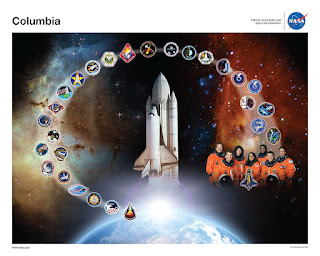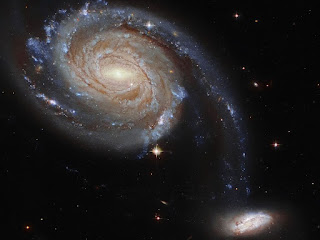Tomorrow marks the 20th anniversary of the horrible disaster in the skies over Texas, when seven lives were lost in the Space Shuttle Columbia while re-entering our atmosphere.
I wrote this poem February 2, 2003, the day after it exploded almost exactly 17 years after the tragedy with the Space Shuttle Challenger. I still remember where I was when I watched the Challenger explode on January 28, 1986. Both explosions were deeply traumatic, and both included members who made history, not just in the explosions, but in breaking glass ceilings and paving the way for astronauts, explorers and scientists in the future.
 |
| Space Shuttle Columbia tribute poster Graphic design credit: NASA/Amy Lombardo. NASA publication number: SP-2010-08-163-KSC |
And wondered what it was like up there.
Over Israel, India and the United States,
The skies looked down on them
Seeming to call to them
Seven children grew up
Dreaming of what they would do
They became pilots, doctors, scientists, colonels
They watched in horror
As the Challenger blew up
Shortly after takeoff
Not knowing that they would one day
Suffer a similar fate
Seven men and women were accepted by NASA
To explore the heavens
To conduct scientific experiments
Seven families and three nations
Watched in awe as the spaceship lifted off
They dreamed of their fathers, mothers, sons, daughters, brothers, sisters
Up there in the skies
Houston got reports of their findings
Scientific knowledge advanced
Until the communication stopped
Seven families waited at Cape Canaveral’s landing strip
Eagerly awaiting their loved ones’ return
They did not expect their joy to turn to tears
They did not expect to hear news of the Columbia
Exploding over Texas
Scattering all over the largest continental state in the US
Seven men and women were lost that day
Seven families learned that their loved ones
Would not be returning
Seven families suffered the same pain
As seven other families
Seventeen years earlier
Three nations lost their sons and daughters
The first Israeli and the first Indian in space
Lost.
Why did this happen?
How?
Praise the Lord
He can do wondrous things
He can work through tragedies
Who knows?
Perhaps this was the tragedy
That will cause many lost souls
To consider where they will go
Maybe people will be saved for eternity
Because God used an exploded space shuttle
And seven lost lives
To bring them to Him
May God have all the glory!





.jpg)